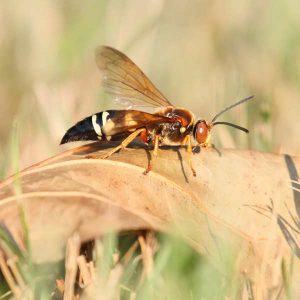in Cicadas Bees and Wasps
They’re big, they buzz, and they’re back!
They look mean. Even their name sounds menacing. No wonder so many people are alarmed just by the sight of the big, buzzing cicada killer wasp.
And understandably so, given that they’re the largest wasps in Ohio, measuring around 1¼ inches in length. Their black and yellow markings are also similar to those found on a hornet, meaning the two insects are regularly mistaken for one another. And high summer in the Buckeye State is peak time for cicada killer wasps, the males of which tend to aggressively buzz anything—including people—that enters their territory.
 Rest easy, though. While they look scary, killer wasps are not typically dangerous—unless you’re a cicada. That (as the name implies) is what they’re after. But since cicada killer wasps are so numerous in the summer, and since they’re so often confused for the more dangerous hornet, knowing how to spot and potentially control them may come in handy.
Rest easy, though. While they look scary, killer wasps are not typically dangerous—unless you’re a cicada. That (as the name implies) is what they’re after. But since cicada killer wasps are so numerous in the summer, and since they’re so often confused for the more dangerous hornet, knowing how to spot and potentially control them may come in handy.
How do I identify cicada killer wasps?
July and August are when cicada killer wasps are most active, hunting the dog-day cicadas, which they feed to their larvae. Their size, markings, and buzzing sound are all designed to intimidate. And though at first glance they can resemble a yellowjacket or hornet, there are several characteristics that set the cicada killer wasps apart.
- Look down, not up: Female cicada killer wasps burrow into the ground to build their nests, and are capable of displacing several pounds of soil. They’re fond of well-drained soil in full sun, such as at a playground or on the edge of a patio or driveway.
- Men don’t sting: The males of the species are more aggressive, guarding against anything that might venture into the area of the nest. But the males don’t have stingers, so their buzz is worse than their bite. Females do have stingers, which they use to paralyze cicadas, but they generally aren’t aggressive toward people.
- Solitary creatures: Unlike many other types of stinging insects that share a nest or hive, cicada killer wasps are typically solitary. But large accumulations of them can still build up in one area over time, given that developing larvae may all emerge as adults at around the same time.
When do cicada killer wasps become a problem?
Entomologists consider cicada killer wasps a beneficial species of insect, since they control a cicada population capable of damaging trees. But once cicada killer wasps burrow in and find a place where their needs are met, they can become tough to get rid of. There are some situations when a homeowner might want to consider controlling cicada killer wasps on their property. 
- Tunneling trouble: The burrowing of a female cicada killer wasp, which creates a tunnel up to six inches wide, can cause unsightly mounds of upturned soil in a yard. Given that the wasps prefer well-drained soil, they’re also capable of disturbing root systems in a vegetable garden or flower bed.
- Watch that patio: Outdoor areas made of brick or tile, like a patio, walkway or even the edge of a driveway, can become destabilized if a female cicada killer wasp upturns too much earth around it.
- Pets and children: Loose sand in a child’s sandbox makes an ideal nest for a female cicada killer wasp, surely a concern for parents. And though females don’t typically bother humans, dogs that dig when they spot holes in the ground may run the risk of getting stung.
Are there control methods for cicada killer wasps?
Given that the wasps prefer loose soil in full sun, homeowners can try tactics such as adding shade, deepening mulch piles, and regularly churning any sand or loose earth to discourage females from nesting. Growing a thick layer of turfgrass can also discourage nesting and can eliminate an infestation within a few years.
An insecticide treatment can be effective if applied to the opening of each nest, though dust has provenmore effective than sprays, and repeat applications are often required. Having your property checked regularly as part of a pest prevention program can help ensure that cicada killer wasps or other pests don’t become a problem. Avoiding an infestation begins with proactive inspection and regular treatment.
To learn more about treating cicada killer wasps or about a general pest prevention system, call A-1 Able Pest Doctors at (800) 737-8189.
Tags: Cicadas Bees and Wasps

Recent Comments